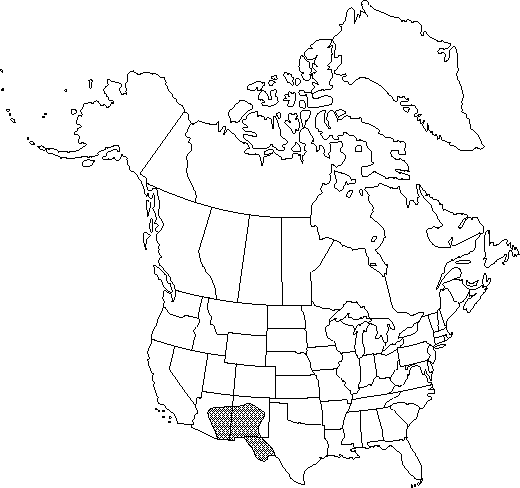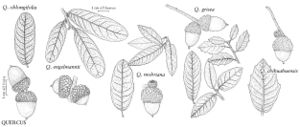Difference between revisions of "Quercus grisea"
Overs. Kongel. Danske Vidensk. Selsk. Forh. Medlemmers Arbeider 1854: 171. 1854.
FNA>Volume Importer |
imported>Volume Importer |
||
| Line 58: | Line 58: | ||
|publication year=1854 | |publication year=1854 | ||
|special status=Illustrated | |special status=Illustrated | ||
| − | |source xml=https:// | + | |source xml=https://bibilujan@bitbucket.org/aafc-mbb/fna-data-curation.git/src/bb6b7e3a7de7d3b7888a1ad48c7fd8f5c722d8d6/coarse_grained_fna_xml/V3/V3_1146.xml |
|genus=Quercus | |genus=Quercus | ||
|section=Quercus sect. Quercus | |section=Quercus sect. Quercus | ||
Revision as of 22:58, 27 May 2020
Large shrubs or moderate trees, deciduous or subevergreen, to 10 m. Bark gray, fissured. Twigs gray, 1-2 mm diam., sparsely or densely stellate-tomentulose or tomentose when young. Buds dark red-brown, ovoid to subglobose, 1-2 mm, stellate hairs causing yellowish color, at least on outer scales; stipules persistent, 1-4, subulate, pubescent, at base of terminal buds. Leaves: petiole 3-10 mm. Leaf blade oblong to elliptic or ovate, (15-)25-35(-80) × (7-)15-30(-40) mm, thick and leathery, base cordate or rounded, margins minutely revolute, entire or dentate with mucronate teeth, secondary veins 6-10 on each side, branched, apex acute, sometimes obtuse, rarely rounded; surfaces abaxially dull gray-green or yellowish, minutely stellate-pubescent with interlocking hairs, secondary veins very prominent, adaxially dull green, very sparsely and minutely stellate-pubescent, secondary veins slightly raised. Acorns solitary or paired, subsessile or on peduncle 0-30 mm; cup from deeply goblet- to deeply cup-shaped, 4-10 mm deep × 8-15 mm wide, enclosing to 1/2 nut, scales broadly ovate to oblong, proximal scales slightly or markedly tuberculate and whitish canescent, tips closely appressed, red-brown, thin, glabrate; nut light brown, ovoid to narrowly ovoid or ellipsoid, 12-18 × 8-12 mm. Cotyledons connate.
Phenology: Flowering spring.
Habitat: Igneous or dolomitic slopes, oak woodlands, juniper woodlands, desert chaparral
Elevation: usually above 1500 m
Distribution

Ariz., N.Mex., Tex., Mexico (Sonora, Chihuahua, and Durango).
Discussion
Some of the specimens referred to Quercus endemica by C. H. Muller should be placed in Q. grisea.
Numerous hybrids between Quercus grisea and other white oaks, including Q. gambelii, Q. mohriana, Q. arizonica, and numerous species in northern Mexico, have been reported. In the Hueco and Quitman mountains of trans-Pecos Texas, putative hybrids of Q. grisea × Q. turbinella Greene occur.
Selected References
None.
